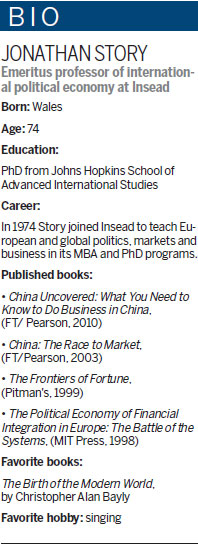The new global bedrock
Updated: 2014-10-31 14:13
By Cecily Liu(China Daily Europe)
|
|||||||||||
China is assuming greater responsibility in international affairs, Scholar says
China is now assuming responsibility as a new global pillar of stable growth after economically relying heavily on the United States, says Jonathan Story, emeritus professor of international political economy at Insead, the European business school.
The rise of China as a new foundation of power provides a source of stability to international order and greatly benefits many emerging economies like Africa and Latin America, Story says.
"Since 1978, there is no doubt that China's long-term development has been to first promote domestic development and to take a cautious approach to international affairs," he says.
In 1978, Chinese leader Deng Xiaoping led the country's reform and opening-up policies that fueled the country's economic miracle over the next three decades.
"The advice of Deng Xiaoping was very appropriate. It was to keep your head down and play by the rules of the international game until the time comes when we are really developed," Story says. "Deng's idea was development first - we stick to our positions and don't pay attention to foreign negative comments about our domestic affairs. But we do appreciate learning from other people's experiences and advice, and keep a modest but growing profile in international affairs."
While China has focused on economic growth, its contributions to and record of participation in multilateral forums have been moderate.
On the issue of climate change, for example, China announced in 2009 that it would reduce the intensity of its carbon dioxide emissions per unit of GDP in 2020 by 40 to 45 percent compared with 2005 levels, an announcement the United Nations Environment Program praised.
But Story says China's global contributions are now beginning to evolve as the country emerges as a powerful player in international relations.
Story says the turning point in China's global engagement came after the US government invaded Iraq after the Sept 11 attacks.
In 2003, Chinese Foreign Ministry spokesman Kong Quan said the US-led military operation violated the principles of international law.
"It ignored opposition to the attacks from most of the countries of the world and went around the UN Security Council to initiate military action against Iraq," he said at the time.
Story says "the Chinese government was not happy with the result of the Iraq invasion. It led to China emphasizing that it would emerge as a peaceful power". China has since maintained its relationships with neighboring countries and other global players within the Confucius tradition, a key aspect of its overall soft-power policy, Story says.
In 2007, then-president Hu Jintao stressed the need to promote the Chinese culture as the country's soft power in a keynote speech to the 17th National Congress of the Communist Party of China. Since then, Chinese leaders have been building on this soft-power campaign, which is based on the principles of two historic figures - Confucius and the 15th century explorer Zheng He.
The Confucius tradition emphasizes values of peace - including strong family loyalty, ancestral worship as well as respect of elders by their children and of husbands by their wives - and encourages these values to be implemented in politics.
One example of China's growing soft power is the building of Confucius Institutes around the world. The institutes, which teach Chinese language and culture and are affiliated with foreign universities, have helped the world to better understand the country.
China's international influence has also grown due to woes in the US and European Union economies. One major benefit of China's emergence is its increased trade and investment interaction with other developing economies, such as those of Africa and Latin America, Story says. China is now one of the top trading partners in the world.
He says there was considerable hope in the 1960s that Africa would become an economic growth engine. But because of Africa's political turmoil over the following decades, its overall economy languished. Today, there is renewed hope because of expanded investments from and trade ties with China that began in the early 2000s.
"One of the more hopeful influences for Africa has been China. Compared to European counterparts, China's involvement in Africa is often criticized as not being supportive of democracy, or is criticized as the second colonization of Africa. I have never subscribed to that."
He says he agrees with the Chinese policy of non-interference in Africa's domestic matters and its no-strings-attached approach to aid and economic partnerships.
"The domestic affairs of a country are the domestic affairs of a country. You could do business with local governments who you may not privately appreciate."
While Chinese investors may seem to be exploiting the continent of its resources, over time Chinese, Western and African companies will begin working better with each other to achieve mutual benefits, Story says.
He says China's contributions to boost African growth and prosperity benefits the global economy. One direct impact of China's aid has been the reduction of illegal African immigrants to Europe.
"The more successful Africa is, the less African people will try to swim across the Mediterranean to Europe."
China's presence in Latin America is also important. It is the biggest trade partner for a number of Latin American countries.
Before China's emergence in Latin America, the subregion traded mainly with the US, Story says. But with China's presence, many countries in the subregion can reduce their dependence on the world's largest economy.
To become a leading global power, China must act confidently in its dealings with neighboring countries and international powers, Story says. It also needs to open up its financial markets. Liberalizing the renminbi and the exchange rate are crucial steps, he says.
But he stresses that China's emergence should not be seen as a direct challenge to US dominance as the significance of a power struggle between the two countries is exaggerated. He adds there are more bilateral benefits that can be achieved between the two countries.
Still, as China emerges on the global stage, it must be careful to avoid assuming that its local experiences are universal, he says.
"One thing China should never do is to be xenophobic, which is to say, 'We are big, we are great, we are old'. This gets them nowhere. China has to break away from the world its ancestors made."
He explains that while China must follow its ancient values of harmony and peace, it cannot be arrogant and assume it understands the history of every nation in the world.
Despite China's growth internationally, it still has a great deal of work to do domestically, including addressing the challenges of urbanization, inequality, its aging population and environmental sustainability, says Story, adding that China may still need 30 to 50 years to catch up to advanced Western countries.
He says he hopes the international community can support China as it develops its own style of diplomacy and development, he says.
"We should be careful to think of China within its own historical context, within its own specificities, and not apply our chosen criteria or our interpretation of criteria to Chinese circumstances.
"China is capable of following its own direction. But with such a large economy, with ever more impact on the rest of the world, with ever more responsibility in global affairs and regional affairs, I would argue that China should become a global player in a much more evolved international system."
cecily.liu@chinadaily.com.cn

|
Jonathan Story, emeritus professor of international political economy at Insead, says China's global contributions are beginning to evolve as the country emerges as a powerful player in international relations. Cecily Liu / China Daily |
(China Daily European Weekly 10/31/2014 page32)
Today's Top News
Trilateral talks on Ukraine gas reaches agreement: EU
Culture ministry: no politics, no propaganda, only China
World Bank pledges $100m more to fight Ebola outbreak
Canadian PM to attend APEC
Russia 'willing' to co-op with Ukrainian parliament
China to help build Ebola quarantine center in Liberia
Tycoons' gift to Yale stirs debate
180 'foxes' hunted back to China
Hot Topics
Lunar probe , China growth forecasts, Emission rules get tougher, China seen through 'colored lens', International board,
Editor's Picks

|

|

|

|

|

|






